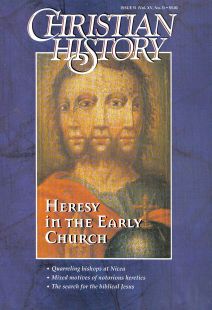Christian History Infographic — Sifting Through the Christ Controversies
Many distinctions they made are difficult to translate into English. Still, all parties agreed on one thing: God is impassible, that is, he not subject to change or feelings. But how do you combine this with the Scriptures that imply Christ “became” human and suffered?
In particular, Christians argued passionately about two things:
Is Jesus Divine or Human?
Christ Is Fully Divine!
Most of these people were driven by the conviction that only God can save humankind. Thus they were willing to protect the deity of Christ, even at the expense of his humanity, or in the case of the modalists, at the expense of the Trinity of persons.
Docetists, e.g., Gnostics: The divine Christ would never stoop to touch flesh, which is evil. Jesus only seemed (dokeo, in Greek) human and only appeared to die, for God cannot die. Or, in other versions, “Christ” left “Jesus” before the Crucifixion.
Key text: Phil. 2:8: “…and [Christ] being found in appearance as a man…”
Apollinarians: Jesus is not equally human and divine but one person with one nature. In Jesus’ human flesh resided a divine mind and will (he didn’t have a human mind or spirit), and his divinity controlled or sanctified his humanity.
Key text: John 1:14: “The Word became flesh” [and not a human mind or will].
Modalists, a.k.a. Sabellians: God’s names (Father, Son, Holy Spirit) change with his roles or “modes of being” (like a chameleon). When God is the Son, he is not the Father. There is no permanent distinction between the three “persons” of the Trinity, otherwise you have three gods.
Key texts: Ex. 20:3: “You shall have no other gods before me” and John 10:30: “I and the Father are one.”
Christ May Be Special, But He’s Not Divine!
These people took seriously the Gospels’ portrait of Christ, in which Jesus is portrayed very much as a human being.
Ebionites: For these conservative Jewish Christians, God is one, and Jesus must be understood in Old Testament categories. Jesus was merely a specially blessed prophet.
Key text: 1 Tim. 2:5: “For there is one God and one mediator between God and men, the man Jesus Christ.”
Adoptionists, a.k.a., dynamic monarchianists: No denying Jesus was special, but what happened is this: at birth (not conception) or baptism, God “adopted” the human Jesus as his special son and gave him an extra measure of divine power (dynamis, in Greek).
Key text: Luke 3:22 (in some ancient versions): “You are my beloved Son, today I have begotten you.”
Arians: The Son as Word, Logos, was created by God before time. He is not eternal or perfect like God, though he was God’s agent in creating everything else.
Key text: John 1:14: “The Word [is] the only-begotten of the Father.”
How is Jesus Both Divine and Human?
Christ: One Nature!
Monophysites, e.g., Eutychians: Jesus cannot have two natures; his divinity swallowed up his humanity “like a drop of wine in the sea.”
Key text: Col. 1:19: “For God was pleased to have all his fullness dwell in him.”
Christ: Two Persons!
Nestorians: If you dismiss Jesus’ humanity like that, he cannot be the Savior of humankind. Better to say he has two natures and also two persons: the divine Christ and the human Christ lived together in Jesus.
Key text: John 2:19: “Destroy this temple and I will raise it up in three days” [i.e., though the human Christ will be destroyed, the divine Christ will continue].
The Orthodox View
Jesus is fully human and fully divine, having two natures in one person—“without confusion, without change, without division, without separation.”
Key text: Phil. 2:5–11: “Christ Jesus … being in very nature God, [was] made in human likeness … and become obedient to death … Every tongue [should] confess Jesus Christ is Lord.”
By the Editors
[Christian History originally published this article in Christian History Issue #51 in 1996]
Next articles
The Defining Moment
Key portions of the church’s most important theological statement.
J. Stevenson and Peter L’HuillierWhy Bishops Should Be Trusted
When some early Christians said they had secret apostolic teaching, one church father said, “Not likely.”
Irenaus of LyonOrigen: Model or Heretic?
He created controversy when he tried to explain the gospel in terms his culture could grasp.
Kenneth R. CalvertHudson Taylor & Missions to China: Did You Know?
Remarkable or little-known facts about Hudson Taylor and missions to China.
Samuel H. ChaoSupport us
Christian History Institute (CHI) is a non-profit Pennsylvania corporation founded in 1982. Your donations support the continuation of this ministry
Donate



